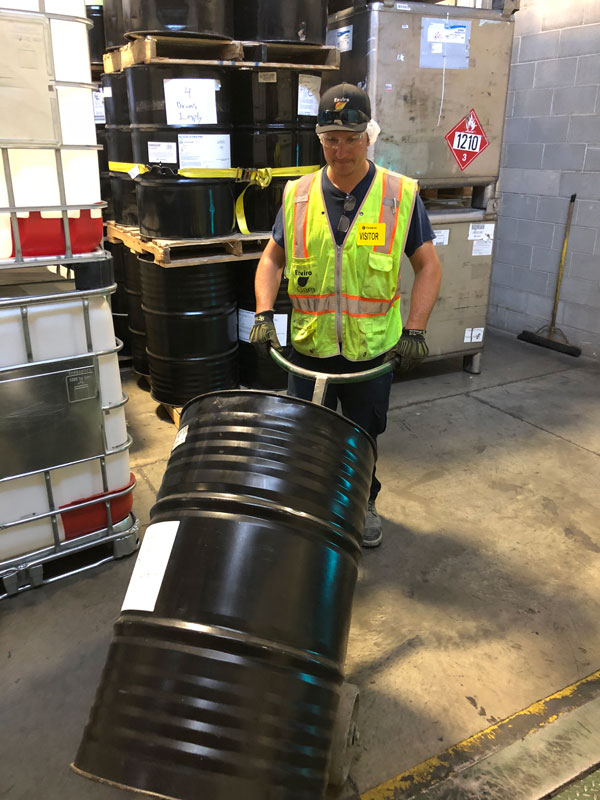
Need for Industrial Chemical Waste Disposal : How Enviro Care Helps
Chemical waste is produced by almost every industry, and most of it needs to be recycled or properly disposed of.
The EPA (Environmental Protection Agency), an independent executive agency of the U.S.government, oversees environmental protection matters and has established guidelines for the proper disposal of industrial waste.
Industrial waste includes waste generated from:
- Commercial, industrial and trade activities
- Primary industries such as agriculture and forestry
- Cafes, restaurants, hotels, and motels
The EPA assesses penalties for dumping, abandonment, and mismanagement of industrial waste. Waste can be disposed of only at lawful places.
Avoiding penalties should not be the only motivating factor for proper chemical waste disposal. Mismanaged chemical waste costs our society and the environment.
Health Hazards to Human
Chemical waste poses an immediate danger to humans in close vicinity to it. Hazardous chemical waste requires more attention than non-hazardous waste. Hazardous waste can either be solid, liquid or, gaseous, and displays at least one of these characteristics:
- Reactivity
- Toxicity
- Corrosivity
- Ignitability
Workers in factories directly responsible for handling the waste and communities near the dumping site are at the highest risk.
The risks are both accidental and medical in nature. Some caustic chemical wastes like peracetic acid, sodium hypochlorite, etc., react with living tissue and cause chemical burns.
Ignitable chemical waste easily catches fire and poses a threat to property and human life.
Reactive wastes are unstable, even under “normal conditions.” These wastes become lethal when mixed with water. The by-products can include toxic fumes and gases that can damage the nervous system or cause eye infections, or even death.
Toxic chemical wastes can get into the human system via polluted groundwater and cause chronic conditions including intestinal infections, birth defects, liver disease, heart defects, miscarriages, cancer, etc.
Have you heard of the term “biomagnification?” It’s the phenomenon in which toxin levels increase exponentially in animal bodies as you move up higher in the food chain. Apparently, humans that eat fish and meat have significantly higher levels of toxins in their bodies than the animals beneath them in the food chain.
Effects on the Environment and Wildlife
Chemical waste changes the environment, and it can take decades to restore normal living conditions.
Some chemical wastes are harmless enough to be poured down the sink. But special care has to be taken when disposing of hazardous wastes. Methods like incineration, landfilling, and underground injection are used to dispose of chemical waste. If the boundaries of these land disposal sites give away, toxins can leak into underground water. Thus, make sure your waste is being disposed at a site that complies with the regulatory requirements of landfills.
Even the chemical waste in the vicinity of a factory is washed away or runs off directly into nearby water bodies or seeps into the soil.
Water pollution results in the death of aquatic wildlife and the animals and birds that drink that water or find their food in that water body. Sometimes, part of the water body is rendered inhabitable for aquatic life. It can take decades to remediate.
In spite of these disastrous effects, water pollution is only considered a short-term effect of chemical waste mismanagement. The long-term effects include birth defects, mutilation, and extinction of species.
Cost to your Business
Dumping chemical waste may seem a cheap solution, but this mindset is short-sighted. The expenses of mismanagement of chemical waste add up.
The EPA can charge a penalty of up to $2 million from corporations that dump waste or stockpile waste illegally. The penalty applies to illegal landfilling and dumping of hazardous waste, liquid waste, chemical waste, etc.
Chemical waste can also cost your business directly and indirectly. Direct costs include the insurance paid for the workers’ injuries and illness. Unmanaged chemical waste is capable of causing accidents that can cost you around $10,000 on average.
The indirect costs of unmanaged chemical waste include:
- Lost production time
- Lost productivity of injured personnel
- Clean-up and start-up of operations
- Reduced employee morale
- OSHA penalties
- Reputational damage to your company
Chemicals can also degrade construction materials over time. Some chemicals such as alkalis and sulfates react with building materials and cause stresses and cracks in the structure.
When you work with a waste management company, your investment in chemical waste disposal will outweigh the cumulative expenses caused by the mismanagement of chemical waste.
How Enviro Care Can Help
We believe that our work should not only prevent future harm but also benefit your business in the long term. We can help you implement cost-effective strategies for the disposal of your company’s chemical waste.
By partnering with Enviro Care, you can prevent damage to the structure of your plant or factory, avoid penalties by OSHA and EPA, and tell your customers and employees that you care about the safety and well-being of the people involved with your company.
Enviro Care has the expertise to remediate contaminated sites and reverse as much damage as possible. Through chemical waste disposal and remediation, Enviro Care plays its part in mitigating the damage caused to the ecosystem by the waste produced by human activity.
We are licensed and permitted to transport any kind of chemical waste, hazardous and non-hazardous, except those that are radioactive and explosive.
As we are not affiliated with any disposal site, you can expect impartiality when consulting with us.
